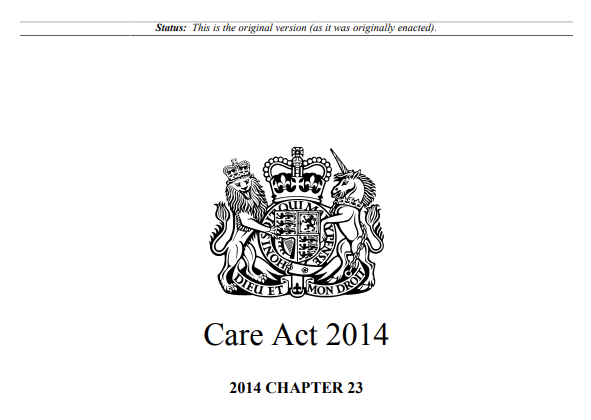The Care Act 2014 is a significant piece of legislation that has brought about important changes in how care and support services are provided in England. For families and individuals receiving care and support, understanding the key points of the Care Act is crucial. This article aims to summarise the key aspects of the Care Act 2014 that are most relevant to you and your rights, helping you navigate the care and support system more effectively.
Key Principles
- Eligibility Assessment
One of the fundamental principles of the Care Act is that local authorities must carry out an assessment to determine an individual’s eligibility for care and support. This assessment should consider your physical, emotional, and social needs. The result of this assessment will help determine the level of care and support you are entitled to.
- Personal Budgets and Care Plans
The Care Act promotes the use of personal budgets and care plans. If you are eligible for support, you have the right to request a personal budget, which is an allocation of money to pay for your care and support. You can work with your local authority to create a care plan tailored to your specific needs and preferences.
- Preventing Abuse and Neglect
The Care Act emphasises the importance of safeguarding individuals from abuse and neglect. You have the right to be safe and protected from harm, and local authorities have a duty to investigate and address any concerns regarding your safety.
- Carer’s Rights
If you are a family member or friend providing unpaid care to someone, the Care Act recognises your vital role. Local authorities have a duty to assess your needs and provide support when necessary. You have the right to a Carer’s Assessment, which considers your physical and emotional wellbeing.
- Continuity of Care
The Care Act promotes continuity of care and support. If you move to a different area or your circumstances change, your local authority must ensure a smooth transition of care to maintain your wellbeing.
- Charging for Care
The Care Act sets out rules regarding how local authorities can charge for care and support services. Importantly, local authorities must conduct a financial assessment to determine your ability to contribute to the cost of your care, taking into account your income and savings.
- Advocacy Support
If you find it challenging to express your views or understand the care and support process, the Care Act ensures that you have access to an independent advocate. An advocate can help you communicate your preferences and ensure your rights are upheld.
- Reviewing Your Care and Support
Your care and support plan is not set in stone. You have the right to review and reassess your needs and preferences with your local authority. If your situation changes, your care and support should be adjusted accordingly.
- Information and Advice
The Care Act requires local authorities to provide information and advice to help individuals make informed decisions about their care and support. You can seek guidance from your local authority to better understand your options.
- Complaints and Appeals
If you are dissatisfied with the care and support you receive or the decisions made by your local authority, the Care Act allows you to make a complaint or appeal the decision. Your local authority should have a clear procedure in place for handling complaints and appeals.
To summarise
The Care Act 2014 is designed to protect the rights and wellbeing of individuals receiving care and support, as well as their families and carers. Understanding your rights under this legislation is essential to ensure you receive the appropriate care and support tailored to your needs. If you have questions or concerns, don’t hesitate to reach out to your local authority for guidance and support. Your wellbeing is at the heart of the Care Act, and it’s crucial to know your rights so that you can make the most of the care and support available to you.
What next
The most sensible thing to do is contact your local authority who have dedicated adult social care and health teams that understand your position and will be able to provide you with very personalised guidance. Equally, charitable organisations like Age UK are also valuable sources of information.
If you are unsure what to do next, or would like impartial and no-obligation support, you can contact our team who will be happy to help and guide you.




